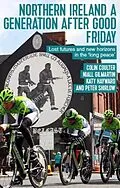The Good Friday Agreement is widely celebrated as a political success story, one that has brought peace to a region that was once synonymous around the globe with political violence. The truth, as ever, is rather more complicated than that. In many respects, the era of the peace process has seen Northern Irish society change almost beyond recognition. Those incidents of politically motivated violence that were once commonplace have become thankfully rare and a new generation has emerged whose identities and interests are rather more fluid and cosmopolitan than those of their predecessors. However, Northern Ireland continues to operate in the long shadow of its own turbulent past. Those who were victims of violence, as well as those who were its agents, have often been consigned to the margins of a society still struggling to cope with the traumas of the Troubles. Furthermore, the transition to 'peace' has revealed the existence of new, and not so new, forms of violence in Northern Irish society, directed towards women, ethnic minorities and the poor. Northern Ireland a generation after Good Friday sets out to capture the complex, and often contradictory, realities that have emerged more than two decades on from the region's vaunted peace deal. Across nine original essays, the authors offer a critical and comprehensive reading of a society that often appears to have left its violent past behind but at the same time remains subject to its gravitational pull.
Klappentext
'At a time when the currents of politics are more unpredictable than ever, it is tempting to look for the historical tide flowing in a certain direction, allowing complex questions to be reduced to a simple answer. The authors resist that intellectual temptation. The book challenges some easy assumptions, questions some lazy ideas and provokes the reader into serious reflection about Northern Ireland's present and future.' Arthur Aughey, Emeritus Professor of Politics, Ulster University 'Timely and thoroughly researched, this book documents the remarkable changes in Northern Ireland society over the last two decades. [] This book should be indispensable reading for anyone who wants to understand the specificities of Northern Ireland within the intensifying debates over Irish unity, the break-up of the UK and the long-term ramifications of Brexit and the pandemic.' Liam O'Dowd, Emeritus Professor of Sociology, Queen's University Belfast The Good Friday Agreement is widely celebrated as a political success story, one that has brought peace to a region that was once synonymous around the globe with political violence. The truth, as ever, is rather more complicated than that. In many respects, the era of the peace process has seen Northern Irish society change almost beyond recognition. Those incidents of politically motivated violence that were once commonplace have become thankfully rare and a new generation has emerged whose identities and interests are rather more fluid and cosmopolitan than those of their predecessors. However, Northern Ireland continues to operate in the long shadow of its own turbulent past. Those who were victims of violence, as well as those who were its agents, have often been consigned to the margins of a society still struggling to cope with the traumas of the Troubles. Furthermore, the transition to 'peace' has revealed the existence of new, and not so new, forms of violence in Northern Irish society, directed towards women, ethnic minorities and the poor. Northern Ireland a generation after Good Friday sets out to capture the complex, and often contradictory, realities that have emerged more than two decades on from the region's vaunted peace deal. Across nine original essays, the authors offer a critical and comprehensive reading of a society that often appears to have left its violent past behind but at the same time remains subject to its gravitational pull.
Inhalt
Northern Ireland a generation after Good Friday: An introduction 1 From the 'long war' to the 'long peace': Northern Ireland since the Good Friday Agreement 2 Fragmented, staggered and inept: addressing the legacy of the Troubles 3 Conflict-related prisoners: the perpetual trap of criminalisation 4 Ghosts of our lives: spectres of the past in recent Northern Irish cinema and television 5 More than two communities: those who are both, neither, other, and next 6 Rethinking the post-conflict narrative: women and the promise of peace in the 'new' Northern Ireland 7 The Political economy of peace in Northern Ireland: social class in an age of boom and bust 8 Changed utterly? Northern Ireland's paralysis in a world of uncertainty Bibliography Index
